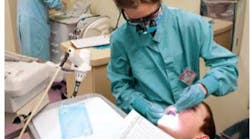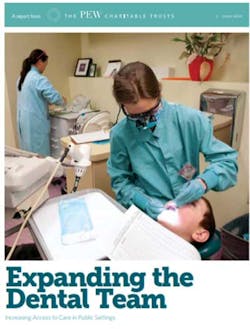As I write this newsletter, I’m preparing to leave for the third North American Dental Hygiene Research Conference, Oct 16-19, in Bethesda, Maryland. After a three-week vacation in Tuscany, Italy, I’m switching gears and getting ready for an action-packed few days. The theme, “Beyond the Boundaries: Discovery, Innovation and Transformation,” is very indicative of the status of the dental hygiene profession.(1)
Dental hygiene is in a time of change and transformation. Innovative models using dental therapists and hygienists have been shown to deliver cost-effective oral health care to the multitudes of Americans with little or no access to care. A recent study from the Pew Charitable Trusts scrutinizes three nonprofit settings where midlevel providers (MLPs) work as part of larger interdisciplinary groups.
Innovative ways of delivering oral health care are evolving to reach underserved populations. One strategy practiced in more than 50 nations is to authorize midlevel dental providers, such as dental therapists, to provide routine preventive and restorative care, such as placing restorations. Research has confirmed that therapists provide high-quality, cost-effective routine care and improve access to treatment in parts of the country where dentists are insufficient to satisfy the need or demand. Midlevel providers are currently practicing in Alaska and Minnesota, were recently authorized in Maine, and are being considered for licensing in 15 additional states.(3) Read the report for more details.(2)
Similarly, The Future of Nursing explores how nurses' roles, responsibilities, and education should change significantly to meet the increased demand for care that will be created by health care reform and to advance improvements in America's increasingly complex health system.(4) See the nursing infographic to see how that profession attempts to transform practice, education, and leadership to meet the demands of the future.(5)
In clinical news, we’ve learned that there is an association between depression drugs Selective Serotonin Reuptake Inhibitors (SSRIs), the most widely used drugs for the treatment of depression, and dental implant failure.(6) SSRIs were reported to reduce bone formation and increase the risk of bone fracture. Since osseointegration is influenced by bone metabolism, this study investigates the association between SSRIs and the risk of failures in osseointegrated implants. The authors conclude that within the limits of this study, these findings indicate that treatment with SSRIs is associated with an increased failure risk of osseointegrated implants.(6)
In this newsletter, you will read about the Alliance for a Cavity Free Future, a new discovery in treating Type 1 diabetes, a way to reduce no shows, and why obesity is in the news yet again. Thanks to all contributors to this newsletter!
Sincerely,
Maria Perno Goldie, RDH, MS, is the editorial director of RDH eVillage FOCUS.
References
1. https://dent-web10.usc.edu/dhnet/
2. http://www.pewtrusts.org/~/media/Assets/2014/06/27/Expanding_Dental_Case_Studies_Report.pdf
3. W.K. Kellogg Foundation, “Dental Health Now: State Updates” (June 2012), http://www.wkkf.org/static/dentaltherapy/may/state-update/index.html
4. Institute of Medicine. The Future of Nursing: Leading Change, Advancing Health. Washington, DC: The National Academies Press, 2011.
5. http://www.iom.edu/Reports/2010/The-Future-of-Nursing-Leading-Change-Advancing-Health/Infographic.aspx
6. Wu X, Al-Abedalla K, Rastikerdar E, et al. Selective Serotonin Reuptake Inhibitors and the Risk of Osseointegrated Implant Failure: A Cohort Study. JDR September 3, 2014. Published online before print











